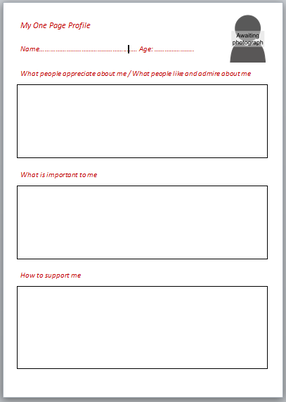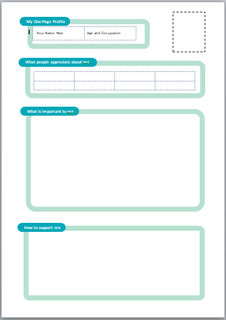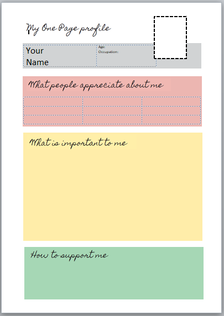one page profiles
|
The purpose of a one-page profile and a person-centred description is to provide a short summary of person-centred information. This helps people in the child or young person's life to use to either get to know them quickly, or ensure that they are providing consistent support in the way that the child or young person wants.
One page profiles are not just for EHC Plans but can be used for any child or young person where you need to get basic information across quickly in writing to:
It can also save you 'repeating' yourself to professionals in meetings etc. |
Click on the pictures below to download blank sample templates and posters. Our thanks to Helen Sanderson for sharing their free downloads, for more templates and completed samples, please visit the website. http://helensandersonassociates.co.uk/person-centred-practice/one-page-profiles/one-page-profile-templates/ |
They are not the latest way to produce 'good paper', but by considering what is important to and for a person, and what good support looks like, they are a way to create actions that make a difference.
The one-page profile provides the information to use to base conversations about what is working and not working in the person's life. Even where someone is not supported by services, this information can still be important to record and share in this way.
The one-page profile provides the information to use to base conversations about what is working and not working in the person's life. Even where someone is not supported by services, this information can still be important to record and share in this way.
Good Practice for One Page Profiles
What people appreciate about me / What people like and admire about me
Name, Age and Photo - let them choose a favorite photo.
Like and Admire - admire is what somebody thinks is good about your child or young person.
This section is the positive things and talents that they have. It does not include what they have done or their rewards.
Make sure you use strong, positive statements, and not ‘usually’ or ‘sometimes’.
It could include:
What is important to me
This is a bullet list of what really matters to your child or young person. This is from their point of view, even if others do not agree. It should be detailed and specific to them.
This section needs to have enough information. This is so that someone who does not know your child or young person can understand who they are. It is not just a list of what they like and do not like. It is about what and who is most important to them. This could include:
How to support me
List a few things that help support your child or young person.
It can include physical objects such as a special knife and fork or drinking cup, coloured paper or PEC cards. Do they have any special clothes, toys or gadgets they like to use?
It can be emotional such as specific words, timings and contact. What support could be offered if they were feeling anxious? Do they prefer not to be touched ie shaking hands or hugs?
Think about a good day and a bad day.
What people appreciate about me / What people like and admire about me
Name, Age and Photo - let them choose a favorite photo.
Like and Admire - admire is what somebody thinks is good about your child or young person.
This section is the positive things and talents that they have. It does not include what they have done or their rewards.
Make sure you use strong, positive statements, and not ‘usually’ or ‘sometimes’.
It could include:
- Loving, sensitive and caring or brave and determined
- Always wants to do his/her best and never gives up
- He/She works really hard and wants to learn
- What do they do best? It could be a beautiful smile, tells jokes or makes a lovely cup of tea
What is important to me
This is a bullet list of what really matters to your child or young person. This is from their point of view, even if others do not agree. It should be detailed and specific to them.
This section needs to have enough information. This is so that someone who does not know your child or young person can understand who they are. It is not just a list of what they like and do not like. It is about what and who is most important to them. This could include:
- Who are the important people are in their life? When and how you spend time together.
- What they like doing and anything that is of interest to them.
- Information about how they live their life.
How to support me
List a few things that help support your child or young person.
It can include physical objects such as a special knife and fork or drinking cup, coloured paper or PEC cards. Do they have any special clothes, toys or gadgets they like to use?
It can be emotional such as specific words, timings and contact. What support could be offered if they were feeling anxious? Do they prefer not to be touched ie shaking hands or hugs?
Think about a good day and a bad day.
The most common errors in one-page profiles and person-centred descriptions are:
- Assuming that if it is important to others in the person's life (for example, staff or families), it must be important to the person. Among the worst examples was a plan that said that implementing a restrictive behaviour programme (that the person clearly hated) was important to the person.
- Describing what is important to the person in brief, telegraphic phrases that give an idea of what is important, but are easily subject to misinterpretation by the reader. A common example is to have the single word 'privacy' listed, without saying more about what privacy means to the person. Since, in the absence of other information, people operate out of their own experiences and perceptions, privacy will be interpreted as meaning what it means to the reader and this is likely to be different from what it means to the individual.
- Avoid the word ‘regular’ – does that mean daily, weekly or yearly?
- Be specific about who you mean - spending time with family should be; 'I play football every Sunday afternoon in the park with my Dad'.
Please visit the Helen Sanderson website for more detailed information and a video on how to create a one page profile for your child or young person.
http://www.helensandersonassociates.co.uk/person-centred-practice/one-page-profiles-2/
Thank you to 'Together All Are Able' and Helen Sanderson Associates for their information.
http://www.helensandersonassociates.co.uk/person-centred-practice/one-page-profiles-2/
Thank you to 'Together All Are Able' and Helen Sanderson Associates for their information.







